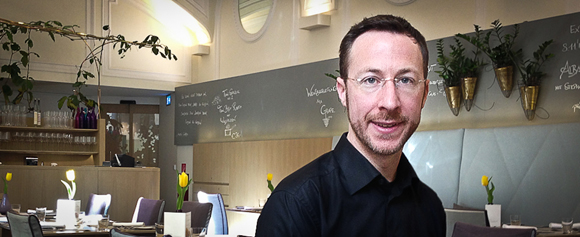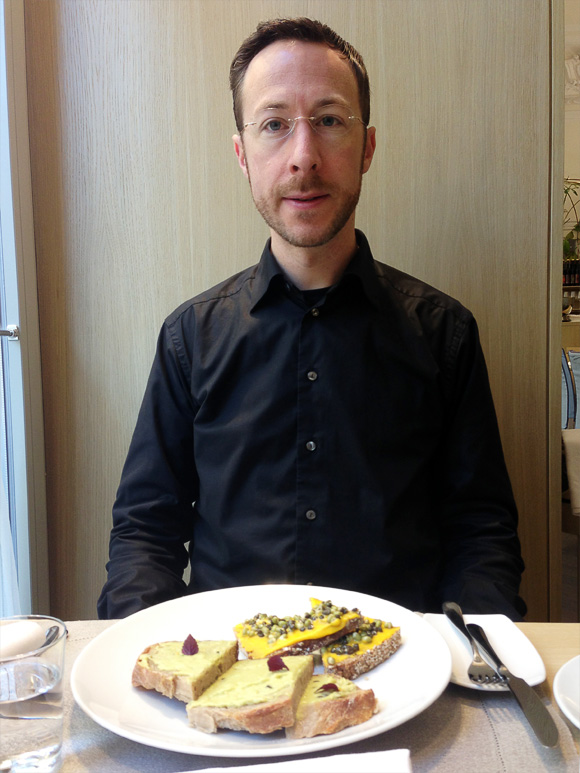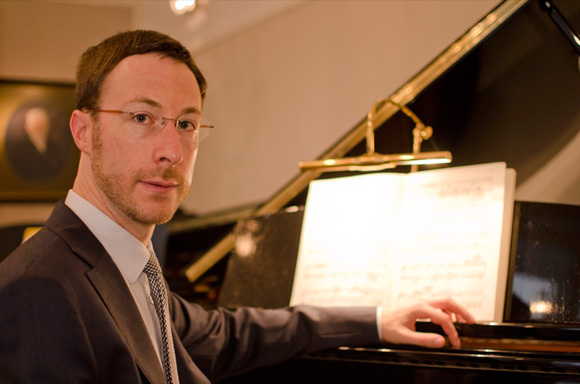Albert Frantz is a world-class pianist from Pennsylvania who started his career at the extraordinary late age of 17. His early piano teacher told his mother to throw her money in the garbage rather than spending it on piano lessons for Albert. He discovered his love for classical music while in high school, which made him accomplish seemingly impossible things. He was the first pianist in a decade to receive a Fulbright scholarship to study in Vienna, which finally led him to the home country of many of his musical idols. In addition to playing and teaching the piano he enjoys racing cars and is currently training for an Ironman.
I had the chance to meet Albert for breakfast at Tian, a classy vegetarian restaurant in the center of Vienna, just a few minutes from St. Stephen’s Cathedral. Some rays of sun came through the big window on the street side, while Albert ordered “Tian Vit”, a menu consisting of coarse brown bread with avocado and passion fruit crème, spelt bread with sprouts and porridge with berries.
DD: Pianists at your level normally start at the age of 8 or even younger…
AF: Even younger! A colleague of mine, a very famous pianist, is sometimes asked by interviewers, “You started the piano late, didn’t you?” to which she answers, “Yes, very late, I was 8.” Often they start at two or three these days, though four or five is very normal. Seven is acceptable, but they say eight is starting to get late. At least that’s what we tend to assume. If there is one thing that I want to communicate – and I hope to do it through my own work in my own field – I think we place limitations on ourselves. We don’t really know our true capabilities, or we let the world place limitations on us. We let other people and society tell us what we can’t do”. What if we ask ourselves what we really care about? “What would I do ideally and how far can I go?” We simply don’t know our own potential.
DD: How did you accomplish becoming a world-class pianist and teacher starting at the late age of 17?
AF: I am happy that on the one hand I did have a natural talent, but, on the other hand, I really attribute so much to having found great teachers. I’m absolutely not self-taught. I was just fortunate enough to find wonderful teachers who recognized that I had talent and took me under their wing and really helped me to maximize that. I still need that until this day. I think it’s incredible important to have teachers and mentors and trainers.
DD: Which effort was needed to achieve what you achieved so far?
AF: An enormous effort. I wish it hadn’t been quite so much. Actually my parents were not exactly happy. At that time, their idea for me was to go to university and study something that would get me the best job. You’re supposed to do normal things, like starting a family, getting your house in the suburbs with a white picket fence, the family dog, etc. I didn’t go for that life. I think it is a wonderful life path—I know plenty of people who did and lead very happy and very fulfilled lives—but it wasn’t necessarily for me. Growing up, I was always fascinated by science and I always knew that I would become a scientist or an engineer of some sort. Then I discovered music very late, but I knew that it was my real passion, even if I had to go my own way back then, with some significant challenges. At one point, unfortunately I had some major problems with my spine. It looked like I would never be able to perform again. This made me unable to perform for a long time and I took a lot of physical therapy and did a lot of sports. Fortunately, I was able to avoid surgery and I am very happy that I didn’t have to go under the knife. In the end, I always kept going. So when It looked like there might not be a way, I just thought to myself that I just need to find it, because there is always a way. It’s just a test. So whenever there is an obstacle and we think we can’t go further, to me that means it is just a test. A test of real power, a test of our commitment, our determination.
DD: Later on you got a Fulbright scholarship and today you are playing in great concert halls and also play endorsements for producers like Bösendorfer. Did you think about that when you were 17, when you started out with playing the piano? Could you imagine something like that back then?
AF: Yeah, young people, young athletes for example dream of playing in the major leagues and young creative people, actors, musicians dream of making it big. I don’t know if I thought about that. I just knew there was something in me that I have to pursue. I don’t have some big, glamorous career right now; I am not unknown either, but for me what is most important is the quality of the work that I do. This, for me, is really an important topic. I think in our society, too often we look for shortcuts. We see certain pop stars for example, we see them rise and fall, and sometimes it seems to me that we seek cheap fame, because we think that the fame is going to bring us something. We think that if millions of people like us, then we get all this love. To me it is better to do my best work and to know I really strive to be the best that I can and to find mentors that help me to get better and know that I have done good work. That’s more important to me than doing mediocre work but becoming very famous for it.
DD: On which level do you categorize your playing today?
AF: The important thing is to reach the level of artist where hopefully nobody cares about how fast your fingers are, and people just concentrate on what you have to say artistically. That is when you transcend technique, what every artist really works on. To me that’s what it is really all about.
DD: Do you think you reached that level already?
AF: Well, it’s my job to be an artist! Which is not to say that other people are not able to play the same pieces better and more expressively. At some point it becomes subjective.
DD: Who is your favorite composer?
AF: Okay, I will give you two answers. One is Beethoven, because of what Beethoven stood for. He represented a real revolution in the concept of what a musical artwork can be. Beethoven created truly self-contained masterworks. Beethoven wrote in a very idealistic manner, and he was extremely aware of his place in cultural history. In some of his later works he even really wrote for the future and even said as much.
In the “Hammerklavier” Sonata, for example, he wrote to his publisher: “Now you have a sonata that will keep the pianists busy when they play it in 50 years”, because he knew that it was not for his current generation of pianists. There, he’s referring not only to the extraordinary technical difficulties of this piece, but also to the incredible musical complexity. It was difficult on all levels. I don’t wish to make the argument that a future generation was required to understand it musically. I’m sure there were also other people who understood it in his time, but aesthetically, it was so futuristic. The same can be said of his last string quartets. Some of it sounds like it was written yesterday. Incredible. So Beethoven is one answer.
And the other is: I have this unhealthy obsession with this composer, Charles-Valentin Alkan, whose music I just recorded for my first CD. He is an unjustly neglected and incredibly interesting composer. He was Chopin’s neighbour and best friend in Paris. He wrote the most fascinating and unfortunately the most purely athletic music ever written for the piano. He really makes the performer sweat.
DD: With which historical composer would you like to have dinner?
AF: Definitely Franz Liszt. He is the most interesting.
DD: Why?
Albert Frantz: Because he was a rock star! He had such an enormous personality. He was also true cosmopolitan. He wasn’t just huddled up in a little apartment, just writing music day and night. He really lived life, he lived a large, grand life. He was surely the most interesting.
DD:Which suggestions would you give to young people starting to play the piano? Which tips would you give them? How should they start out playing the piano?
AF: The most important thing is to find a really good teacher, and this is advice for the parents as well. Try to do everything to find the very best teacher as early in your studies as possible. There is a misconception. All too often we make the assumption that an entry-level teacher is good enough. It’s understandable—parents just want to see whether their child likes music. Yet I think the most advanced, the most experienced and the very best teachers need to be teaching as early in the learning process as possible and not simply at the very advanced, already professional stages.
DD: Which hobbies do you have besides playing the piano? Lately, I saw you quite often in fast cars!
AF (laughing out loud): Yes that’s a new hobby. Racing cars. (Laughing) I have to be careful about that. I’ve gotten to chase Formula One drivers around the racetrack! It definitely makes me nervous. But that’s a fun hobby. I decided one day that life consists of more than just working. There are so many rich experiences to be had. At some point I thought, I have to live more. So when an opportunity comes up, now I say yes, and then find a way. Often these kinds of opportunities are opportunities for growth. We tend to limit ourselves way too much. I am definitely nervous sitting at the wheel of a supercar on a racetrack. But that is an opportunity for growth. We regret the times when we say no to such opportunities. That’s my latest hobby. Another one is that I do a lot of sports and I am training long-term for an Ironman. It’s a goal that I’ve had for several years. And then I thought – wait a second – I am not getting younger. The time to start is now.
DD: When will you go for your first Ironman?
AF: It will take at least two to three years, because the swimming part is really hard for me. But here’s the amazing thing: there are incredible people around us and we don’t even know it. Since finding a new openness to life, to asking myself: “How can I grow?” I keep looking for new things. Now I’m having more fun in life, yet for me it’s really about growth. How can I find more of my potential and learn about new things? Since doing that, it’s been just incredible. I recently got to drag race the top DTM driver in history. For the Ironman I found an incredible coach, a former US swimming champion who now lives in Austria and coaches a triathlon team. He was an Olympic coach. The resources are there. They are all around us. So when we say yes to things, we start to meet the most incredible people who really inspire us.
DD: Is this your advice for other people? Just speak out your dream and go for it?
AF: Yes, absolutely. It’s not about just going for things recklessly, I think that deep down we know—I say this but then I remember Steve Jobs said it as well, and much more eloquently—deep down we know who we really want to become. Everybody has dreams. Some dreams only have to be done once to realize, like skydiving. That can be done once and it is accomplished. Other dreams are more about who you become, becoming a pianist in my case. That was something that took years. So that’s ongoing. I think often our dreams are much closer than we think. I don’t think we could seriously entertain a dream unless some part of us deep down knew that we are capable of achieving it.
DD: Coming to the last question: What is your dream?
AF (thinking): I have so many of them actually. My biggest one is to make as much of a contribution as I am able to in my lifetime. That’s truly my biggest dream. Even if it’s in this tiny part of the world called classical music and even if it’s a relatively small number of people who care about it or appreciate my work. My biggest dream is to make as much of a contribution as possible. And I want to do that in three ways: through my playing, by becoming as good as I can become and leaving behind my best work. The second way is through education. I am equally passionate about education as I am about playing. And the third way is that I hope to inspire some more people to question our limitations. I think we are capable of so much more than we think we are.
DD: Thank you very much.
More information:

Contributed by Manuel





